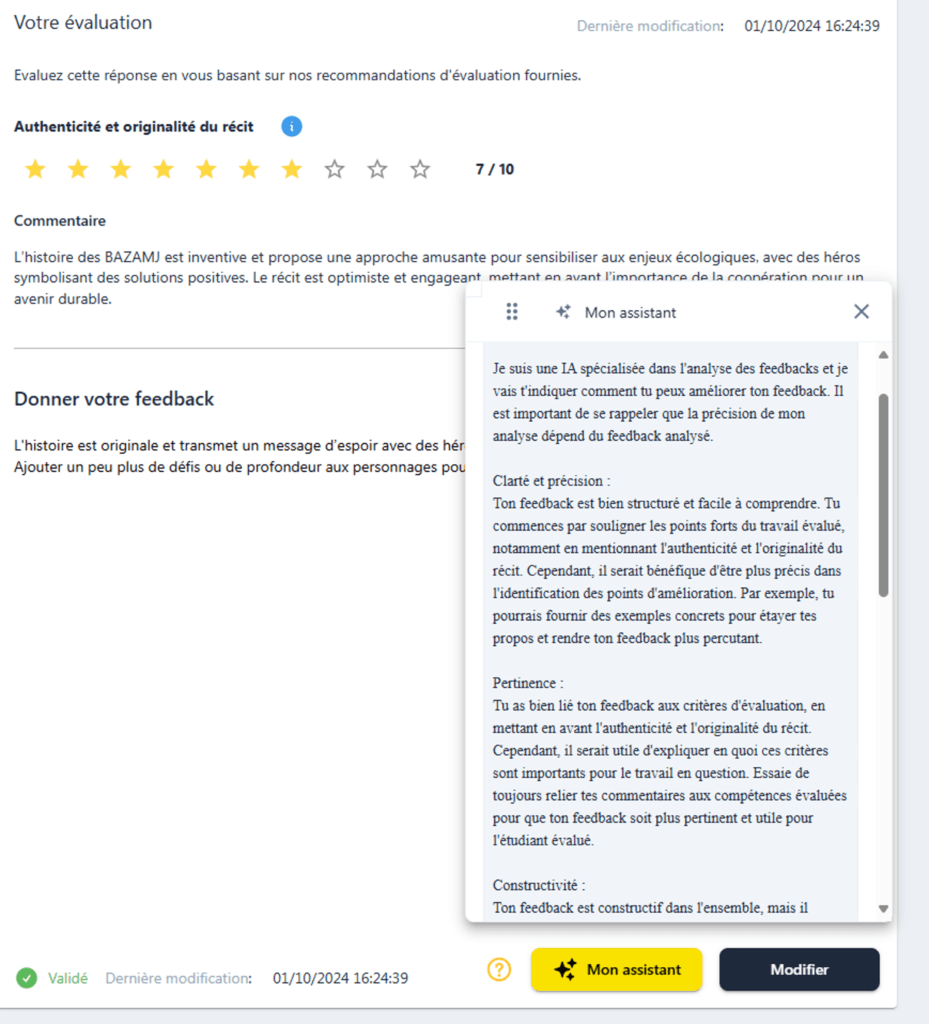Dans le cadre de l’enseignement supérieur, l’évaluation par les pairs est de plus en plus utilisée pour encourager un apprentissage actif et collaboratif. Toutefois, un aspect souvent sous-estimé de ce processus est la charge émotionnelle qu’il génère. Une récente étude publiée dans ScienceDirect (lire l’étude ici) met en lumière l’importance des émotions et de leur régulation dans le traitement des feedbacks, en particulier chez les étudiants en soins infirmiers pendant leurs stages.
Cette analyse offre des perspectives précieuses sur la manière dont les étudiants réagissent aux retours, et comment ces émotions influencent leur apprentissage. Dans cet article, nous explorons les résultats de cette recherche et établissons quelques parallèles avec l’évaluation par les pairs, un domaine où la régulation émotionnelle joue un rôle tout aussi central.
Comprendre les émotions dans le processus de feedback
L’étude menée auprès d’étudiants en soins infirmiers montre que recevoir un feedback, surtout lorsqu’il est critique, déclenche souvent des réactions émotionnelles intenses. Ces émotions peuvent être motivantes, mais aussi inhibitrices si elles ne sont pas bien gérées.
Les chercheurs ont identifié trois stratégies principales de régulation émotionnelle utilisées par les étudiants :
- Réévaluation cognitive : reformuler le contenu d’un feedback pour le percevoir comme une opportunité de croissance, plutôt qu’une critique personnelle.
- Gestion de l’attention : se concentrer sur les éléments constructifs du feedback, en filtrant les aspects potentiellement démotivants.
- Expression émotionnelle contrôlée : exprimer ses sentiments de manière mesurée, afin de préserver un dialogue constructif avec l’évaluateur.
Ces mécanismes montrent que la régulation émotionnelle est une compétence essentielle pour tirer parti des retours. Cela est particulièrement pertinent dans l’évaluation par les pairs, où la diversité des perspectives peut amplifier la variété des réactions émotionnelles.

L’évaluation par les pairs et ses défis émotionnels
Dans un cadre académique, l’évaluation par les pairs implique que les étudiants donnent et reçoivent des retours sur leurs travaux respectifs. Bien que ce processus favorise l’engagement et le développement de compétences critiques, il peut également générer :
- Une appréhension à donner un feedback : certains étudiants craignent de blesser ou de froisser leurs pairs en formulant des critiques.
- Un sentiment de vulnérabilité : recevoir un retour de ses pairs, perçus comme des égaux, peut être plus délicat émotionnellement qu’un feedback venant d’un enseignant.
- Une surcharge cognitive et émotionnelle : lorsque les étudiants doivent traiter plusieurs feedbacks, parfois contradictoires, pour améliorer leur travail.
Ces défis émotionnels peuvent avoir un impact direct sur l’efficacité du processus d’apprentissage.
Régulation émotionnelle : un levier pour améliorer l’apprentissage
Les résultats de l’étude soulignent que les émotions doivent être considérées comme un élément central du processus de feedback. Cela est particulièrement vrai dans l’évaluation par les pairs, où la qualité des interactions repose sur une communication claire et respectueuse.
Voici quelques recommandations, inspirées par les résultats de la recherche, pour favoriser une régulation émotionnelle efficace dans l’évaluation par les pairs :
- Former les étudiants au feedback constructif : sensibiliser les étudiants aux bonnes pratiques pour formuler des retours clairs, bienveillants et structurés.
- Encourager la réflexion personnelle : proposer des activités où les étudiants peuvent analyser leurs réactions émotionnelles face aux feedbacks et apprendre à les gérer.
- Créer un environnement bienveillant : établir des règles claires pour garantir que les retours restent respectueux et orientés vers l’amélioration.

Quelques parallèles avec ChallengeMe
Bien que l’étude se concentre sur les stages en soins infirmiers, ses conclusions trouvent des échos dans les innovations technologiques qui soutiennent l’évaluation par les pairs. Par exemple, dans ChallengeMe nous intégrons des fonctionnalités visant à accompagner les étudiants tout au long du processus de feedback :
- Synthèse des retours reçus : des outils automatisés permettent de faire ressortir les éléments clés des feedbacks multiples, pour aider les étudiants à mieux prioriser leurs efforts.
- Modération des commentaires : garantir un cadre bienveillant en filtrant les retours inappropriés.
- Accompagnement à la formulation : guider les étudiants dans la rédaction de feedbacks structurés et constructifs grâce à des suggestions intelligentes.
Ces fonctionnalités ne remplacent pas la régulation émotionnelle, mais elles offrent un soutien précieux pour réduire la charge émotionnelle et cognitive associée au feedback.
Vers une évaluation plus humaine
L’étude de ScienceDirect nous rappelle que, derrière chaque feedback, il y a des émotions. Qu’il s’agisse de recevoir une critique d’un enseignant ou d’un pair, le ressenti émotionnel influence fortement la manière dont le retour est traité et intégré.
Pour les éducateurs et les institutions, cela signifie qu’il est essentiel d’intégrer la dimension émotionnelle dans les pratiques pédagogiques. Pour les solutions numériques, cela implique de concevoir des outils qui non seulement facilitent le processus d’évaluation, mais qui tiennent aussi compte de l’impact émotionnel sur les utilisateurs.
Ensemble, ces approches peuvent transformer le feedback en un véritable moteur de progression et d’épanouissement pour les étudiants.
Pour approfondir, vous pouvez consulter l’étude complète ici.
